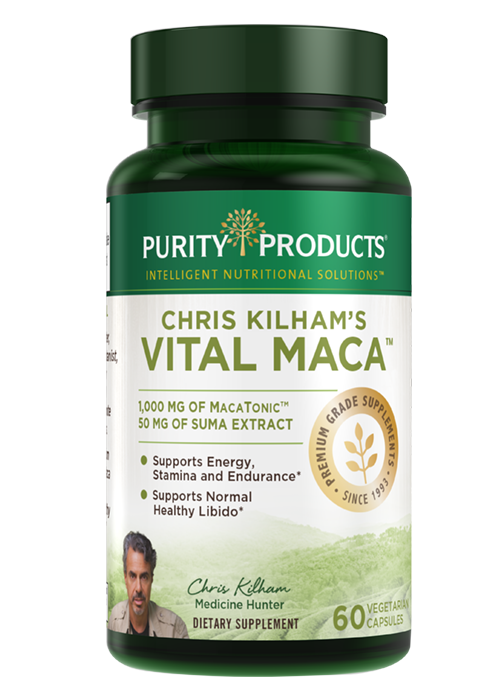Chris Kilham's Vital Maca™
Chris Kilham's† Vital Maca™
Vital Maca™ contains the quality extracts MacaTonic™ and Suma extract, 2 energy supporting herbs used worldwide for their supportive effects on vitality and sexual health.*
Introduction to Maca: Tradition and Science
Maca, also sometimes referred to as Peruvian Ginseng, is a hardy plant that was long ago discovered at high altitudes in the Andes Mountains of South America. Its Peruvian region of growth is known as "among the world's worst farmland," with sub-freezing temperatures and wind strong enough to knock people off their horses. Possibly the only crop in the world capable of growing at altitudes of up to 14,500 feet above sea level, maca was domesticated by the Incas as early as 1600 B.C.
Robust Biochemistry
On nutritional and biochemical scales, maca has a diverse and robust profile. Although the variety of nutrients found in maca are important for the local population, the real interest in maca abroad is due to the potential benefits of the bioactive compounds, such as the glucosinolates (including their derived isothiocyanates and p-methoxybenzyl isothiocyanate). Isothiocyanates are common in the Brassicaceae family of plants, which includes the important cruciferous vegetables, such as cabbage, broccoli, Brussels sprouts, turnips, and radishes; in fact, dried maca looks quite like dried turnips or radishes. It has been suggested that the p-methoxybenzyl isothiocyanates found in maca is in part responsible for some of its traditional health applications.
In addition to holding great value as a dietary staple due to its nutritional value, maca also is prized for its traditional health-promoting uses.
The Science Behind Maca
In 2000, results from a study of mice revealed for the first time that benefits claimed in folklore had some credence: two maca extracts significantly enhanced the libido and mating performance of normal mice. The following year, a human study was published, with results that demonstrated superior semen parameters in men receiving maca tablets for 4 months. In 2002, a randomized, double-blind, placebo-controlled 12-week parallel trial in healthy men aged 21–56 years was published. Sexual desire improved in the men administered maca tablets, independently of changes in mood or blood hormone levels (testosterone levels did not change when using maca). In 2008, interesting results were also seen in a preliminary study of 14 postmenopausal women. In this randomized, double-blind, placebo-controlled crossover trial, maca supplementation for 6 weeks did not exert an estrogenic effect, yet it appeared to be useful in supporting a positive mental attitude towards sexual activity, compared to placebo. Results from a 2010 meta-analysis that included yet more human studies (of both men and women) suggested that maca positively influences sexual health; however, further research is warranted in these areas.
Maca is traditionally used as an adaptogen—a plant known to influence the body's response to physical, biochemical, and psychological stressors. In modern times, its role as an adaptogen is no less useful than 2,000 years ago.*
† Compensated Spokesperson
To achieve the highest standard in specifications of finished product, our manufacturer adheres to the highest quality control measures, including:
- Written Standard Operating Procedures (SOPs) to comply with current Good Manufacturing Practices (GMP) regulations ensuring consistent quality
- Certificate of Analysis available
- USDA Certified Organic Handler/Processor
- NSF - 3rd party GMP certification
- Health Canada facility registration
- Organic Certification: WFCF Organic
To obtain a copy of the Certificate of Analysis, please click here.
| Default SS Frequency | Override Default |
|---|---|
| Default SS Qty | Override Default |
Disclaimer: Product reviews solely reflect the views and opinions expressed by the contributors and not those of Purity Products. Purity Products does not verify or endorse any claims made in these reviews. Statements regarding dietary supplements have not been evaluated by the FDA and are not intended to diagnose, treat, cure, or prevent any disease or health condition.










